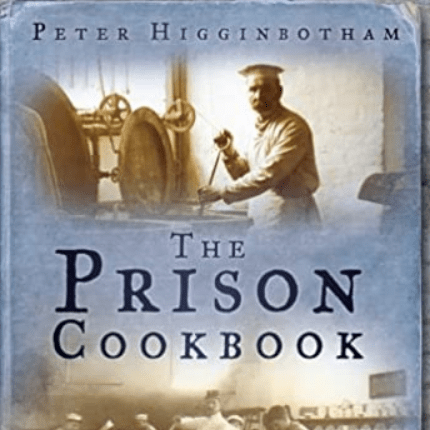Fresh from our foray to Oxford Castle and Prison, and feeling distinctly peckish, it was by a lucky quirk of fate that we came across this culinary crusade in the gift shop. It was made all the more delectable by being written by the famous author Peter Higginbotham, famed genealogist and owner of http://www.workhouses.org.uk/ and http://www.childrenshomes.org.uk/.
Not to be deterred by my travel sickness, as Gem drove I devoured each page from this book as if it were the choicest titbit and I a gastronomic glutton. The title is slightly misleading, insomuch as peter goes above and beyond the mere foodstuffs of the prisons and instead provides a history of them, the laws which filled them and the development of the modern penal system.
From the forest courts of William the Conqueror, to the unwritten laws of ‘chummage’ in debtor’s prisons, Peter unflinchingly takes you on a dark journey, delving into prison conditions and malpractice, ably illustrated and guided by primary sources. Indeed, for the bibliography alone this book was worth the £8.99 we paid.
Beyond the buildings, we were also treated to the changing diets of prisoners throughout the ages. One of the most curious things to note here was the Victorian attitude towards feeding prisoners. Curious insomuch as food was often approached as the bare minimum fuel an inmate needed in order to perform hard labour and, to deter those who might take advantage, was often not of the best taste or quality: practically all inmates who entered prison, even the slimist, lost stones and pounds. Indeed, one Medical Officer mentioned in the book even went so far as to treat his inmates like guinea pigs, cutting portions, certain vegetables and more to see how this affected prison populations. A really nice touch also was the addition of a, authentic 1902 recipe book; if you fancy trying something new, give stirabout a try…if you don’t like the taste, you can always use it as wallpaper paste.
What this book does, beyond mere scholarly research though there is that in abundance, is really paint a picture of the destitution endured by the Victorian poor and what better way to do this, than through the ubiquitous lens of food. Some have greater, others fewer and some almost none at all, but this need for nourishment, in whatever institution or situation, is what makes us human.
9/10 – Well researched food for thought.
